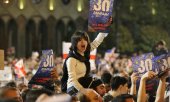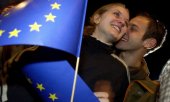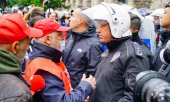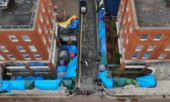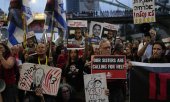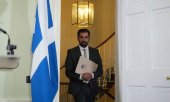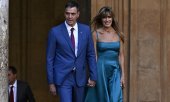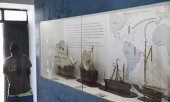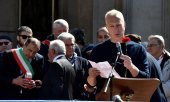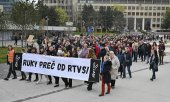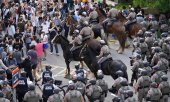Mass protests against the adoption of a "foreign agent" law, which stipulates that media and organisations that receive more than 20 percent of their funding from abroad must disclose their income, are gaining momentum in Georgia. In March 2023, protests against a similar bill ultimately led to its withdrawal. What to make of the current developments - not least in light of Georgia's recently acquired EU candidate status?
Dublin has blamed the controversial Rwanda deal in the UK for a surge in the number of asylum seekers arriving in Ireland. British Prime Minister Rishi Sunak categorically rejected any discussion about their returning from Ireland to the UK, pointing out that Paris has also been intransigent towards London on this issue. Commentators see a dispute in which there are many losers and no winners.
The negotiations between Israel and the radical Islamic organisation Hamas are apparently making progress. According to the British Foreign Office, Israel has made an offer of a 40-day ceasefire in return for the release of Israeli hostages. Commentators discuss whether the impending offensive in Rafah can still be prevented.
Scotland's First Minister Humza Yousaf announced his resignation on Monday - just over a year after taking office. He was facing a vote of no confidence in the Scottish parliament after his Scottish National Party (SNP) terminated its power sharing deal with the Scottish Greens over a dispute about climate targets. The press blames Yousaf and his SNP for the government's collapse.
Spain's Prime Minister Pedro Sánchez will not be stepping down. After suspending his official duties last week he announced on Monday that he would continue as head of government "with more energy if possible". Sanchez had said he was considering resigning after the right-wing organisation Manos Limpias filed a lawsuit accusing his wife, Begoña Gómez, of corruption. Thousands of Spaniards took to the streets over the weekend calling on him to remain in office.
On the occasion of the 50th anniversary of the Carnation Revolution, Portugal's President Marcelo Rebelo de Sousa has called for his country to pay reparations to its former colonies, for example by cancelling their debts. Of all the colonial powers, Portugal is the European country with the longest involvement in the slave trade. The topic is sensitive, as a glance at the commentaries shows.
In Italy, an appearance by author Antonio Scurati on the public broadcaster RAI has been cancelled at short notice. Scurati was due to read a text on the anniversary of Italy's liberation from fascism on 25 April in which he accuses Giorgia Meloni of failing to distance herself from her "post-fascist past". Commentators see the incident as symptomatic of deeper problems.
The Slovakian government under Prime Minister Robert Fico is planning to dissolve the public broadcaster RTVS as announced, and launch a new media organisation under the name STVR. The reform will be presented to parliament for approval in the summer. Critics accuse the government of wanting to create a propaganda channel.
Anger over the humanitarian disaster caused by the Gaza war has caused the protests at several US universities to escalate, with a few anti-Semitic incidents also being reported. At New York's renowned Columbia University, police arrested more than a hundred people. Teaching has been restricted to online lectures. Europe's press looks behind the scenes and draws historical comparisons.

